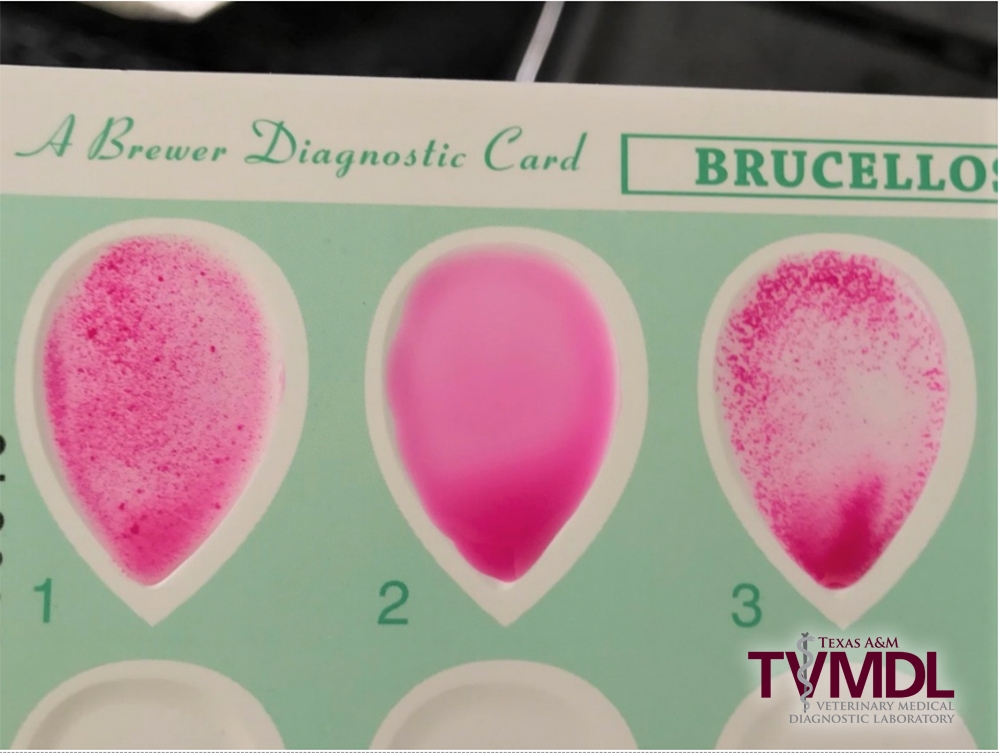Brucella suis in Dogs
By Melanie T. Landis, DVM, MBA and Carlos Rodriguez, BS
A serum sample from a 1-year-old, male, American Staffordshire terrier was submitted to the Texas A&M Veterinary Medical Diagnostic Laboratory (TVMDL) in College Station for Brucella canis testing by the rapid slide agglutination test (RSAT – i.e. the card test). The medical history indicated the dog was febrile with a swollen left testicle and epididymis, slightly enlarged prostate, and neutrophilic on in-house blood work, all classic clinical findings with brucellosis. Therefore, when the RSAT was negative, the referring veterinarian was contacted, and it was determined that the dog lived on rural property with access to wildlife. Given this additional history, it was suggested to test the dog for Brucella suis. A typical B. abortus card test was performed (Figure 1), as there is documented antigenic cross-reactivity between Brucella abortus and B. suis. Both species have a smooth lipopolysaccharide cell surface and lack an O-antigen chain1. Results indicated a strong positive reaction, indicating possible antibodies against B. suis. Upon notifying the referring veterinarian, it was further discovered that the dog lives with two females that are used for hunting hogs and the male had bred both females several months prior. The decision was made to test their sera for B. suis, and both females tested strongly positive on the B. abortus-suis test. Further discussions revealed the female that was bred last, whelped 7 weeks prior to sample submission. The litter included pups that died within days of birth and normal pups. The female that was bred first had a normal delivery with no neonatal deaths. Although she showed no clinical signs of brucellosis (i.e. infertility, abortion/still-births/neonatal deaths, vaginal discharge), she was reported to have helped nurse puppies from the other female’s litter.
While canine Brucella suis infections are not typical, they have been reported in Queensland and New South Wales, Australia2and areas of the United States1, where B. suis is endemic in the feral pig population. Antibodies against B. suis do not cross-react with B. canis; thus, B. suis should be considered as a differential diagnosis in those dogs showing clinical signs of brucella that test negative for B. canis, but have had exposure to feral hogs, through hunting, scavenging carcasses, or environmental exposure. Although transmission of B. suis from dogs to humans has not been reported, B. suis is zoonotic and highly pathogenic to humans1. For owners electing to keep an infected dog, it is strongly recommended that any canine testing positive for B. suisbe neutered (castrated/spayed) in an effort to reduce organism shedding3.
For any questions about this case, contact Dr. Melanie Landis, microbiology veterinary diagnostician, or Carlos Rodriguez, serology assistant section head. To learn more about TVMDL’s test offerings, visit tvmdl.tamu.edu or call 1.888.646.5623.

Figure 1. Brucella abortus-suis card test comparing positive dog samples (wells 1 & 3) to a known negative control (well 2). The visible clumps of agglutination indicate antibodies in the serum.
References
- Ramamoorthy S, Woldemeskel M, Ligett A, et al. Brucella suis Infection in Dogs, Georgia, USA. Emerging Infectious Diseases. 2011;17(12):2386-2387. doi:10.3201/eid1712.111127.
- Mor SM, Wiethoelter AK, Lee A, Moloney B, James DR, Malik R. Emergence of Brucella suis in dogs in New South Wales, Australia: clinical findings and implications for zoonotic transmission. BMC Vet Res. 2016;12(1):199. Published 2016 Sep 9. doi:10.1186/s12917-016-0835-0.
- Veterinary Officer, Animal Biosecurity ad Welfare, NSW DPI. Brucellosis (Brucella suis) in dogs. July 2017, Primefact 6/450, first edition.